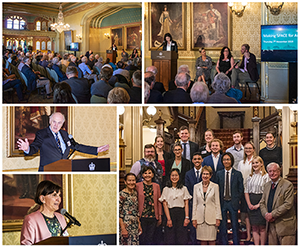Making SPACE for Australia — Royal Society of NSW and Four Academies Forum November 2019
Report by the Forum Convenors: Emeritus Professor Roy MacLeod FRSN and Dr Susan Pond AM FRSN
This year’s Royal Society of NSW and Four Academies Forum devoted to the subject of ‘Making Space for Australia’ drew together, in one day, authoritative voices from the natural, technological and social sciences and the humanities, to consider a range of issues that are likely to inform Australian public policy and public opinion in the decades ahead.
 Held like the four previous Forums, under the gracious Vice Regal Patronage of the Governor of New South Wales and in the ballroom of Government House, Sydney, the inclusive gathering of 140 people represented the Royal Society of NSW, the four Learned Academies, and guests from a cross-section of the space community, including 13 undergraduate students from diverse Faculties across six universities and studying various aspects of space.
Held like the four previous Forums, under the gracious Vice Regal Patronage of the Governor of New South Wales and in the ballroom of Government House, Sydney, the inclusive gathering of 140 people represented the Royal Society of NSW, the four Learned Academies, and guests from a cross-section of the space community, including 13 undergraduate students from diverse Faculties across six universities and studying various aspects of space.
Her Excellency the Honourable Margaret Beazley AO, QC, Governor of NSW, reflected during her opening remarks on Australia’s long interest in reading the Heavens, beginning with the earliest Aboriginal observations and understanding of the constellations and their configurations.
Introduced by Professor Anne Green, Chair of the NSW Division of ATSE, the Keynote speaker, Professor Lisa Kewley, emphasized Australia’s strengths in space science while taking us on a tour of the Universe. The next session, Australia in the Space Age , moderated by Professor Jane Hall, President of the Academy of the Social Sciences, heard papers by the space historian and curator, Kerrie Dougherty on ‘Sixty Years of Australia in Space,’ by Dr Megan Clark (Director of the Australian Space Agency), on the Agency and its work; by Dr Kimberley Clayfield, on CSIRO’s ‘Roadmap for Space’; and by Dr Adam Lewis, of Geoscience Australia, on ‘Seeing and Sensing Australia from Space.’
Dr Donna Lawler, Principal of Azimuth Advisory, moderated the session devoted to Space Law, Security and Ethics. Prof Steven Freeland, the distinguished international Space lawyer, summarized the ‘Limits of Law’ in Space, and Dr Ben Piggott of UNSW Canberra reminded us of the military and geopolitical dimensions of Space policy. Dr Nikki Coleman, RAAF chaplain and Space ethicist, explored the ‘Ethical Challenges in Space: Norms and Conventions in Peaceful Spacefaring.’
A third session, expertly conducted by Ms Annie Handmer, historian of science of Sydney University, on Space and People , highlighted key themes in what is fast becoming the ‘humanities of Space’, with papers by Jonathan Webb, of the ABC, on the ‘Promise and Peril of Space’; by Dr Alice Gorman, of Flinders University, on ‘Space Heritage: Artefacts and Archaeology’ (both now challenged by the profusion of Space debris); a theme capped by the writer and novelist Ceridwen Dovey, on ‘Human Visions and Visitors in Space’.
The final session, Australia's Space Economy moderated by Dr Susan Pond AM, Chair of the NSW Smart Sensing Network, brought us back to Earth, welcoming William Barrett, Senior VP of Asia Pacific Space consultants, who addressed Australia’s promising Space Industry, then Paul Scully-Power, AM, one of Australia’s pioneering astronauts, speaking about the challenge presented by ‘Space 2.0: Small Space Satellite’s’. Finally, Group Captain Jason Lind, explained the role that Defence must and is playing in supporting Australia’s Space industry.
Our rapporteur, Dr Brett Biddington, AM, of Canberra, skillfully summarized the day. He reminded the audience that by a unique combination of history, science, and geography, Australia occupies an important place on the front line of continuing discoveries in Space. He noted the tension between the civil and the defence realms in space as well as an even bigger tension emerging between public and private investment in space.
Judging from the RSNSW’s customary post-conference Survey, the Forum met the challenges of the day, inciting a wide range of questions that continued long after the proceedings ended. At the same time, it foreshadowed a number of fresh questions that may well be asked by academics, governments, and the public at large and at future RSNSW events.
To paraphrase CP Snow, Australia has the future in its sights, and SPACE holds great prospects for the next generation. Bearing a distinguished 50-year history of Space engagement and blessed with major Space-related facilities across the country, Australia can play a far-reaching role in the coming years, not only in science and technology but also in law and ethics.
We are reminded, in celebrating this 50th year since Apollo 11, that the Astronauts left a plaque on the moon that said, ‘We came in peace for all Mankind’. The adventure that lies before us is one in which Australia accepts both the challenge and its responsibilities. We can only hope that this sentiment guides our destiny, our fullest achievement, and remains our uppermost goal.

